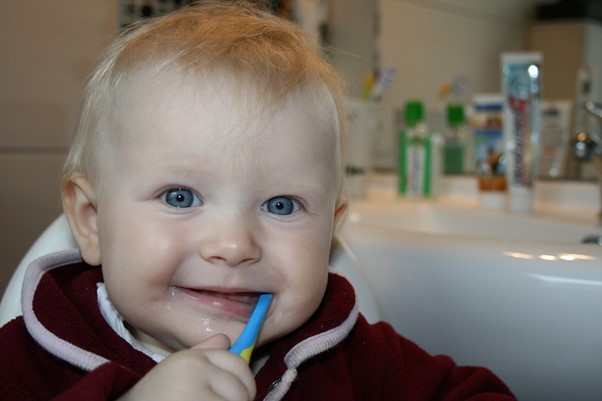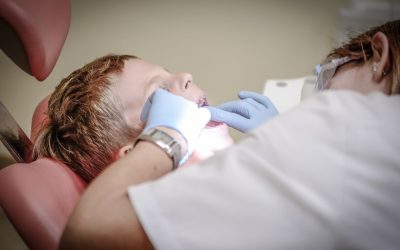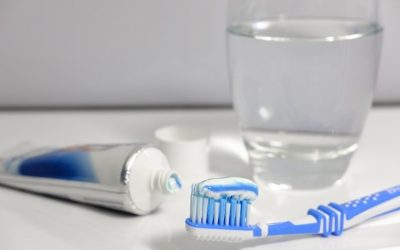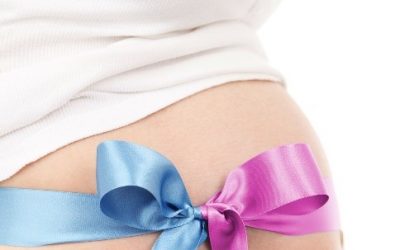Some parents wonder if it’s worth the trouble taking care of temporary baby teeth when they will anyways be replaced by permanent ones in a few years. The fact is, proper dental care is important from the time the baby’s first tooth comes out. This exciting time also means the beginning of the parents’ responsibility in maintaining their child’s oral health.
Why Is It Important To Take Care Of Baby Teeth?
Children develop habits and preferences at a young age. Similar to eating habits, whatever practices you instill on your child will affect their habits for the rest of their lives. Teaching them the value of taking care of teeth and regular tooth care will most likely remain with them until they become adults. 
Moreover, letting baby teeth decay can be bad for your child’s development. It can prevent them from eating well and being able to develop proper speech. Lastly, baby teeth hold a proper place for permanent teeth and when they fall out or are removed too early, the permanent ones may come out crooked.
Interestingly, in rare cases, baby teeth do not have successors and may even stay for the rest of your child’s life.
When Should You Start Brushing Baby Teeth?
A baby’s first tooth should make its appearance between 6 and 12 months, with some kids getting them earlier and some later. There is also no timeline nor order as to which teeth come out first. But what is constant is that the day the first tooth starts to poke out of the gums is when you should start brushing them.
At this age, you do not even need to use a toothbrush. Instead, a clean, wet washcloth or a gauze pad is enough to wipe it clean after mealtimes (or milk) and before going to bed. A tiny (like rice-grain size) amount of toothpaste is enough at this stage and if your baby ends up swallowing it, you do not have to worry. This tiny amount is not dangerous for your child.
When the baby gets more teeth, you can switch to using a toothbrush appropriate for their age. The bristles should be very soft and there should be no more than 3 rows. Finger brushes are also a good idea to start with, before moving on to a baby toothbrush. When it becomes rough at the edges, or when the toothbrush is 3 months old, you should throw it out and get a new one. After this time, bacteria start to build up and should not be used anymore.
Is Fluoride Toothpaste Safe For Babies?
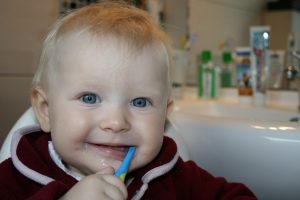 In the past, it was recommended that parents wait until the second birthday before using fluoride toothpaste. This has been changed and the American Academy of Pediatric Dentistry (AAPD) now says it is better to use it right from the beginning. However, use only a smear as big as a rice grain, increasing to a pea-sized amount by the time your kid turns three.
In the past, it was recommended that parents wait until the second birthday before using fluoride toothpaste. This has been changed and the American Academy of Pediatric Dentistry (AAPD) now says it is better to use it right from the beginning. However, use only a smear as big as a rice grain, increasing to a pea-sized amount by the time your kid turns three.
Once your toddler is big enough, teach him to spit it out. If he swallows the tiny amount, it should not be a cause of worry.
What If My Baby Hates Brushing Teeth?
Some babies do get a bit fussy while brushing teeth, especially when they are sore or tender because of teething. Here are some tips you can follow:
- Be Gentle
The gums might be sensitive even when your baby is not teething, so make sure you use a soft washcloth and rub very gently.
- Sing a Song
A nice distraction can keep your baby’s mind off of the task, and even turn toothbrushing into an enjoyable routine. You can look for related songs or even change some words to popular rhymes to make it funny and entertaining.
- Be A Good Model
Babies love copying the parents so let them see mom and dad brushing their teeth before their turn.
- Let Your Baby Play
Kids love to try things out on their own, so let your baby play with the toothbrush a little bit and even put it in his mouth. Even if your toddler tries it out independently, make sure you brush the teeth properly afterward.
Your baby’s first tooth is an important milestone and a signal that parents should begin instilling good oral health habits. Follow this guide and make sure your children will have healthy teeth for the rest of their lives.

